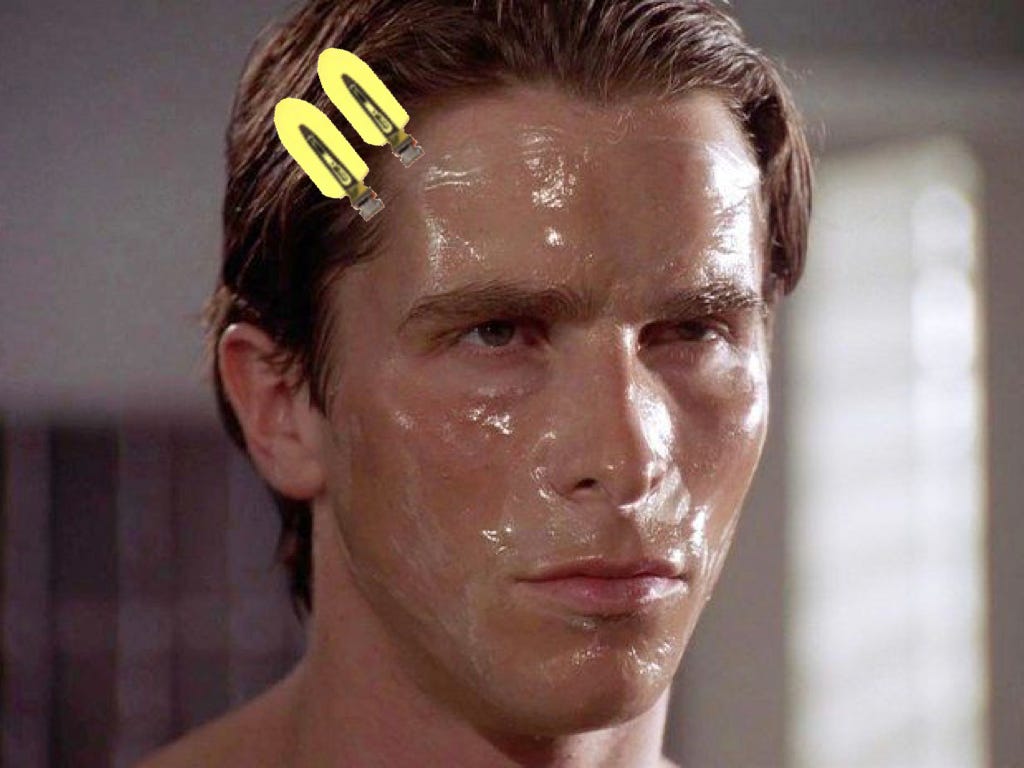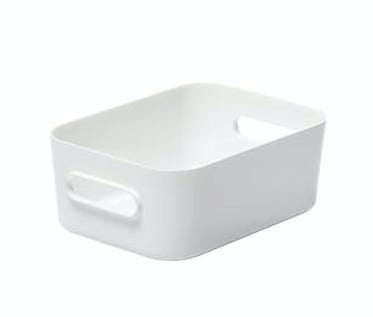When I feel hopeless—sorry, when I feel paralyzed by gratitude—I crack open The Life-Changing Magic of Tidying Up by Marie Kondo and try to change my whole life. It doesn’t bother me that Marie Kondo’s philosophy of using what you already have to organize your belongings—shoeboxes, she says—is completely incompatible with her line at The Container Store. I love her, and I want her to get her bag, or her box, or whatever, and I love The Container Store. It is the definition of liminal, brimming with potential but devoid of anything substantive.
On this particular go-around, I decided to pull out every cosmetic and skincare product from every corner of my apartment. When I saw them all together, something clicked for me. But it wasn’t what I’d hoped. It was more like: Catherine, sweetie, what is this😃
Seeing it all together in my bathroom, which was so full I could barely open the door (to be fair, it is a tiny bathroom) really begged the question: if all—if any—of these products worked, why would I need so many? Skincare is a $130B industry, and there are only like 4 skincare products that actually work. And by work, I mean are clinically proven to change the skin, not just temporarily alter the outermost layer’s appearance, which is already dead.
Ready the tinfoil hat
Approximately four skincare products work. They are:
Retinoids (a form of Vitamin A) - proven to increase cell turnover, increase collagen production, and help with fine lines and acne. There is a range of retinoids, and they don’t all work the same way. Some are better than others (prescription tretinoin and A313 are both quite good, in my experience).
Niacinamide (a form of Vitamin B3) - increases cell turnover, increases ceramides for skin barrier, an antioxidant that disarms free radicals.
Vitamin C - an antioxidant that disarms free radicals, increases collagen production, fades hyperpigmentation, but loses potency very quickly.
Sunscreen - protects the skin from UVA/UVB rays, which make skin age faster, and can cause cancer. There are two types: physical (titanium dioxide or zinc oxide) that block the rays, and chemical, which absorbs the rays before they can penetrate the skin.
From what I’ve read, this is the general consensus. There are probably a few more, but I don’t care to get into it. The point is the list is short. The vast majority of the industry—of most industries—is slick marketing.
A few more points and observations on skincare:
Our skin is a barrier, and a very effective one. Most products can’t actually penetrate the skin deeply enough to get to where they can work (e.g., topical collagen, which is total BS).
When it comes to skincare products, expense and efficacy are not at all correlated.
Moisturizers, humectants, and occlusives (ceramides, petrolatum, glycerin, hyaluronic acid, etc.) all function pretty much the same way. They can be helpful for skin comfort, drawing water to the surface and helping the skin retain moisture.
Most men don’t use many skincare products and they look the same as women, maybe just a little less exfoliated, especially past a certain age. I often think their skin looks healthier overall, as it hasn’t been put through the wringer of dozens of products and exhausting routines.
We all have that one friend who has perfect skin but doesn’t do much of anything to care for it. I believe those people aren’t just lucky, they’re onto something.
If one’s diet, exercise, hydration (not a gallon… let’s be reasonable), hormones, stress levels, mental health, etc., etc., are not doing well, a serum won’t save you.
Dermatologists don’t have “perfect” skin and are not immune to the aging process. Many rely heavily on more hardcore treatments, which brings me to my final point:
There’s a booming market for expensive dermatological treatments like lasers, peels, microneedling, etc., because most topical treatments don’t do that much. (And let’s not forget surgical and non-surgical cosmetic procedures like botox and filler.)
We know it’s a scam
None of this is groundbreaking. We already know this to be true. It also doesn’t mean that the pursuit of beautiful skin or an affinity for skincare products is immoral. I want to have nice skin, I like applying nice skincare products. I like the packaging, I like the smells, I like the textures, I like feeling fresh.
But when I stood in my bathroom, looking at well over one hundred skincare and makeup products, I didn’t feel a casual, guiltless affinity for self-care. I certainly didn’t feel empowered (though God knows what the fuck that means). I felt kind of sad, if I’m being honest. Like I’d been tricked. Like I had shown up to school in a tooth fairy costume, but no one else dressed up. “Oh wow, you really tried hard on that costume, huh? No, it’s cute! I like it!” True story. Devastating.
The embarrassment faded immediately at the prospect of throwing away the majority of the crap I’d bought over the years, because a new feeling came rushing in: fear. No, don’t throw any of it away! What if you NEED it? What if it will HELP you? You spent all this money on it! What if the answer is here somewhere? This the point I’m trying to get at: we’re scared. And nothing makes you behave totally irrationally or pull out your credit card quite like fear. It’s important to ask oneself: am I doing this because it’s working and I’m enjoying it, or am I doing this because a string of fear has been plucked inside of me? The fear-mongering is what I take issue with.
Fear
I think there are five big fears that play into the rise of Big Skincare (only the last one is necessarily true):
Youth is better than aging, and I am aging. So, I must try to prolong what youth I have left for as long as possible.
There is no progress to be made in this world. So, I must prove to myself that progress is possible, even in this small way.
I am stupid and incompetent. So, if I can’t figure this out, I probably can’t figure anything out.
If I don’t, I will look worse than other people my age. So, my participation is imperative.
I will die. So, I must ward off all reminders of death in every way possible.
To summarize: I want to go back to my youth and avoid my inevitable death. And while I’m here I’m afraid I’m stupid and ugly and I can’t change anything.
Nostalgia, helplessness, incompetence, competition, mortality. These are the fears and forces lurking beneath the surface of the endless products, the expensive purchases, the empty promises, the eternal research, the false excitement of maybe this time having the answer. It’s only a matter of time until the industry folds in on itself and admits it, and I can all but guarantee that when that happens, there will be something else for sale.







